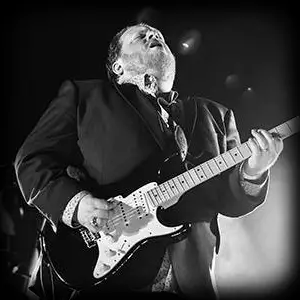Danny Bryant
 Heavily featured in such trade publications as Guitarist Magazine, Guitar Techniques and Guitar And Bass, Danny Bryant is the kind of fleet-fingered guitar master whose appeal would seem limited only to fourteen-year-old aspiring guitar heroes. But there is actually much more to Bryant than his ability to perform amazing feats on a set of steel strings.
Heavily featured in such trade publications as Guitarist Magazine, Guitar Techniques and Guitar And Bass, Danny Bryant is the kind of fleet-fingered guitar master whose appeal would seem limited only to fourteen-year-old aspiring guitar heroes. But there is actually much more to Bryant than his ability to perform amazing feats on a set of steel strings.
Indeed even those who’ve never touched a guitar can instantly understand his appeal. This makes perfect sense given that Bryant sees himself more as a songwriter than a guitarist.
But it wasn’t always that way. His mastery of blues songwriting didn’t come until later.
At fifteen, the blues bug gave young Danny a bite. The two biggest influences at that early stage were Irish guitar legend Rory Gallagher and America guitar whiz Walter Trout.
Inspired by the “wildness and intensity” of Trout’s playing, Bryant embarked on a career in the blues. In later years, Walter trout would become a mentor and colleague for him, leaving him with a number of indelible memories, such as the time he showed up at the studio immediately following a late-night show and played on the song “Days Like This.” According to Bryant, Trout accepted no more payment than a glass of apple juice and a cream cake.
Years later, Bryant returned this and many other favors by filling the spot in for the ailing Trout as he recovered from liver transplant surgery.
Song subjects
 Sooner or later any discussion with Bryant will inevitably lead to the craft of songwriters – and for good reason.
Sooner or later any discussion with Bryant will inevitably lead to the craft of songwriters – and for good reason.
Many of his biggest inspirations were singer/songwriters like John Hiatt, Bob Dylan and Jimi Hendrix. He’s even written a few songs about those who’ve influenced him the most.
And like many others, he hasn’t been shy about summoning his singer/songwriter heroes when in need of inspiration. For the song “Painkiller,” Bryant tried to compose Robert Cray-like lyrics and music reminiscent of John Hiatt.
The result, of course, was a song that sounded like pure Danny Bryant.
Road Warrior Meets Studio Rat
Right on the (Blood) Money
As an Amazon Associate I earn from qualifying purchases.
The sense of pride and sheer joy in Bryant’s playing is evident with every note. The passion speaks louder than any lyric possibly could. And isn’t that what the blues is all about?